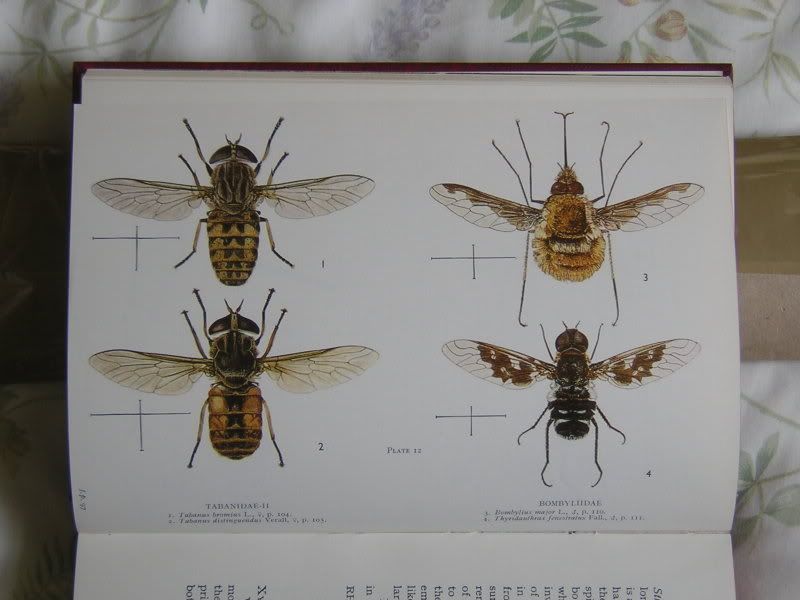The female of one of the Tabanids (Clegs/Horse Flies) is I believe the largest British Fly. Not to be confused and won't be if one settles on you because of its size... about at least twice the size, bulk and wingspan of the Cleg which is far from small.
When they fly slowly around you almost silently before alighting for a blood meal, if they pass near your ears you can clearly hear the hum of their wings ~ sounds like a minature model plane with a motor to my ears.
When I first had one of these large female Horse Flies alight on me years ago, it actually settled on my thick leather belt ( Cow hide ) and thus was unsuccessful in its attempts to gain access to my blood... A bit scary then as I did not know such a large fly existed in the UK.
My father who was always aware of my keen interest in Natural History (which he shared to a lesser extent), actually encouraged it when I was very young say about 5-6 years old. About thirty years ago he paid 50p for a withdrawn Library Sell Off Book... The Flies of the British Isles ... a Warne Wayside and Woodland Series ( Colyer and Hammond ) which I still have. Here's the plate from that book showing these large members of that fascinating family ... the Tabanids.

These tabanids despite their size are very fragile. A simple slap will completely destroy them. However, there are exceptions ...
There is another Tabanid biting fly which I have not seen for some years. It is smaller ~ about Clegg sized ~ and is more colourful having yellow~gold panels in it's thorax. When one first tried it's luck with me I was in a West Sussex wood having been watching
Apatura iris most of the day and was returning to the car. One settled on my hand and I felt it's proboscis penetrate my skin with a touch of pain. I immediately slapped it flat and when I removed my hand from over it, it fully recovered it's shape and form and had another 'go' at me.... Scary! ...

I then pinched it between finger and thumb and it still would not break up. Such treatment to a Clegg or Horse fly would have completely destroyed it. I've looked at pictures in the same book and although it was nearly forty years ago when I had that first experience (and only seen one or two since ) from memory the species appears to be... either
Chrysops caecutiens;
Chrysops relictus or maybe
Chrysops quadratus Tabanids.... one of those almost certainly.
According to Colyer and Hammond..
"These with the pictured wings and iridescent eyes, make them a fine sight to see when at rest, with the sun shining on them"
The females' bright yellow 'panels' on the abdominal segments nearest the thorax certainly give them a distinctive appearance.
Back around 1990, I purchased three acres of land in a remote part of the west of the county. Allowing nature to reclaim this small area and with some management, it has become quite a nice little nature reserve with a good number of butterfly species resident and breeding. About half a mile away there is a stud farm and that maybe why Horse flies, including those big ones as well as those with yellow abdominal panels ( once or twice) , are sometimes present and literally make their presence felt ...
My son visited 'our' reserve after work this evening and reported numerous Marbled Whites and several other species present in good numbers. I have also seen Buzzards (frequent) Barn Owls ( Occasional at dusk) Sparrow Hawks/ Kestrels ( both frequent as numerous small birds and Wood mice present) and best of all, a Goshawk which dived into a thorny Blackthorn and Rose thicket at dusk disturbing numerous small birds which were settling down for the night there.... It chased one which it singled out ... did not observe the outcome. Almost as remarkable, nearby a pair of Hobbys working together taking turns to outfly and catch a Swift... not for nothing is the Swift so called. One of the most remarkable Natural History events I've ever witnessed.... saw the whole pursuit from start to finish. I actually managed to get a picture/slide of the Hobby carrying away the captured Swift which it 'mantled' a few yards away on the path I was walking along.
Apologies for the ambling ramble and going off at several tangerines ...

Well, it helps to pass the time....





